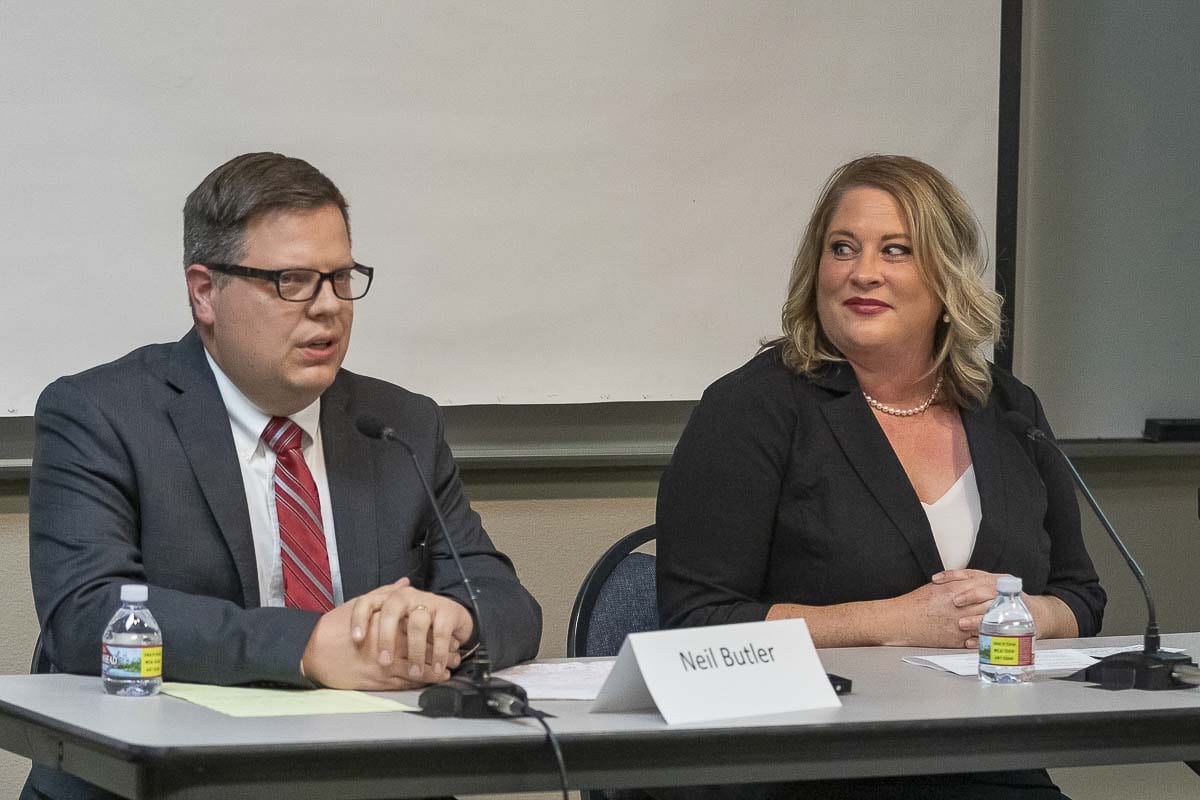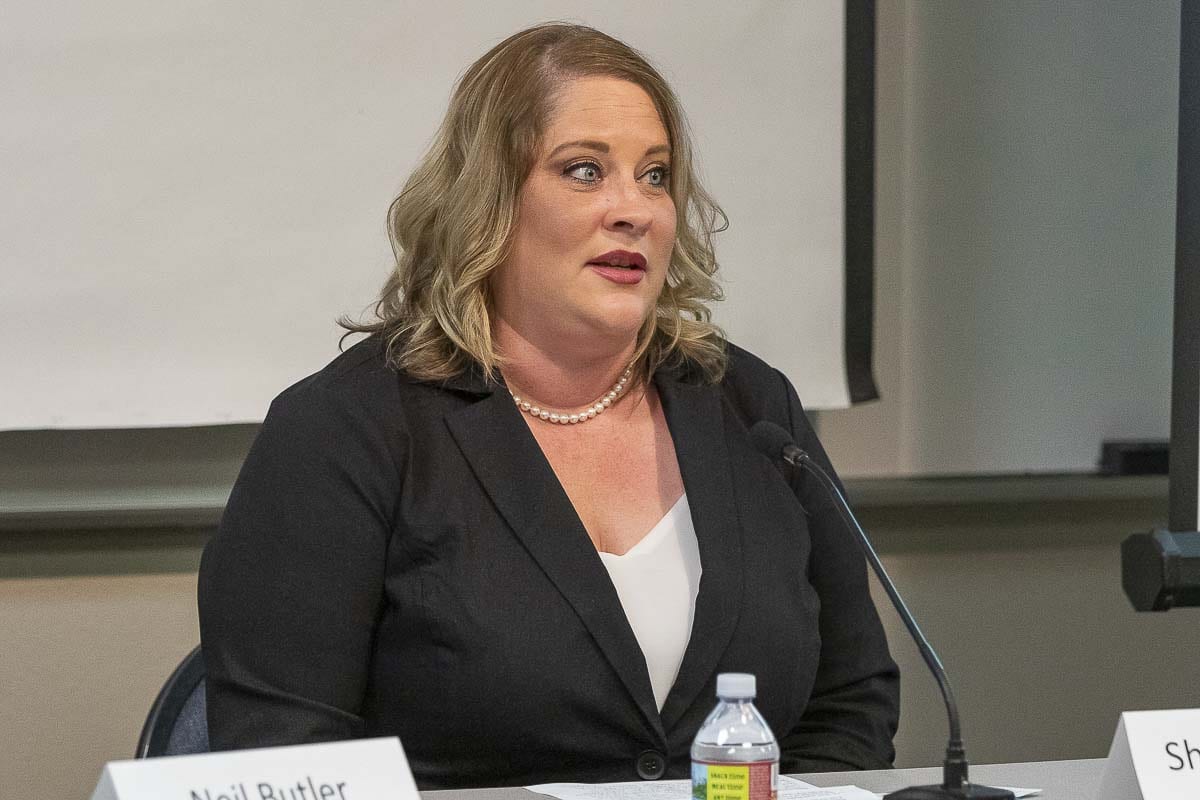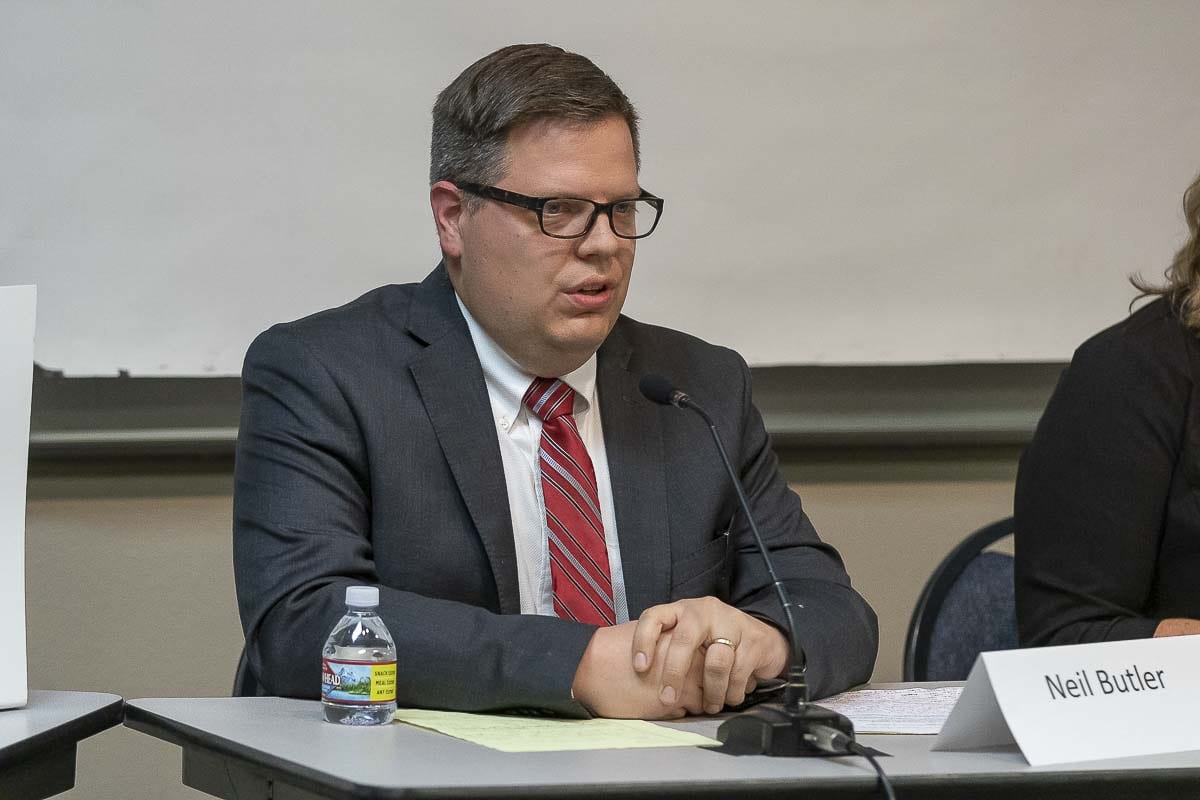While Neil Butler and Shauna Walters are new to politics, they both come from very different backgrounds
BATTLE GROUND — The race for Battle Ground City Council’s Position 3 seat includes two political newcomers, but that’s largely where the similarities end.
The seat was left open when current council member Steve Phelps declined to run for reelection.

Shauna Walters, a former combat medic who spent over two decades in the healthcare field, is now a full-time student at Washington State University Vancouver, studying management information systems.
“I’m changing it up a bit,” she told an audience at the Clark County Fire & Rescue station in Dollars Corner during a League of Women Voters candidate forum.
After growing up in Amboy, Walters said she moved to Battle Ground around 10 years ago.
She jumped into the race this past March, after members of the Battle Ground City Council declined to adopt an ordinance opposing Initiative 1639, which enacted stricter gun control laws in Washington state and drew the attention of groups like Patriot Prayer, led by Joey Gibson.

“During the past several months, I’ve attended most city council meetings, beginning with my group’s plea for a 1639 sanctuary ordinance back in March,” said Walters. “Those meetings sparked my interest in serving our community in a greater capacity. My top two goals, if elected, are to create a salary commission and to bring back and create new traditions that will bring our community together.”
In the August primary, Walters led the field of three candidates with just over 49 percent of the vote. Her opponent, Neil Butler, finished with nearly 33 percent.
Butler is a father of five with a background in public administration and finance, with a focus on parks and recreation. He is currently a store manager for Walgreens.
“On city council, I seek to help improve the lives of citizens of Battle Ground, and be able to address the issues that actually affect the affordability and livability of our community,” said Butler in his opening statement.
The League of Women Voters forum for Walters and Butler focused primarily on handling growth in the city of nearly 21,000 people.
On the city’s Community Visioning process, both candidates said prosperity and growth were the most important goals, in their estimation.
Butler noted the city currently has a backlog of $66 million in sewer needs, along with $15 million in water supply projects to plan for.

“Those current issues really inhibit a lot of the opportunities that we could take advantage of,” said Butler. “As we focus on improving our infrastructure, addressing the water and the sewer and the roads and sidewalks, and all these other parts that really make up a community and facilitate its ability to grow, that will be able to bring jobs and prosperity to our citizens.”
Walters said she’s heard from a lot of residents who say they want Battle Ground to avoid bringing in heavy industry in order to facilitate job growth. Instead, they want to support local small businesses and address concerns with traffic congestion.
“I would like to do a new traffic study,” she said, “to find a new East-West arterial and alternatives that do not include the use of eminent domain.”
Asked whether proposed development along part of the Chelatchie Prairie shortline railroad would be positive for Battle Ground, the candidates diverged somewhat.
Butler said the potential for high-paying jobs is a positive for the area, and that existing businesses like Anderson Dairy, which uses the line, need to be supported. But Butler said he believes the issue needs to be approached cautiously.
“There are some concerns I have,” said Butler. “One of them is the easement. They’re talking about using eminent domain to be able to address that, and some are talking about a mile easement and that might be too big.”
Walters was less nuanced in her response to the question, saying residents along the line in Brush Prairie have made it clear that they would prefer not to see heavy industrial come into the area, along with the increased traffic on both the rail line and the roads.
“I would rather see a trail system and tourist attraction built along that line,” said Walters.
On the issue of affordable housing, both said they support the recent agreement by the city of Battle Ground to have the Vancouver Housing Authority build a new 80-unit apartment building for low income seniors.
Walters said she believes Battle Ground is nearing capacity for new housing and industrial development, without an expansion of the existing urban growth boundary.
“Battle Ground is seeing a rash of high density housing developments with only a few feet of space between houses and small yards,” said Walters. “This forces the children out onto the street to play, and creates dangerous situations with cars parked on both sides of streets that are already very narrow.”
Butler said the city looks to the state’s Growth Management Act when it comes to determining the mix of residential and commercial or industrial development, and that the focus needs to continue being on bringing living wage jobs to the area.
“When you sit on the highway and you watch [our citizens] drive out of town to Portland or Vancouver, they are taking valuable tax dollars with them,” said Butler. “And by focusing on our commercial development and bringing businesses to Battle Ground, we offer our citizens the opportunity to live, work and play, and bring those tax resources back to our city to make the improvements needed to address the needs of our citizens.”
In regards to addressing homelessness, Butler and Walters both take the view that the city must work with churches and other charitable organizations to address those needs, and that there are a number of existing programs to do just that.
In their closing statements, Butler said he is “focused on doing the mundane.”
“It’s addressing zoning, and policing, and roads, and infrastructure, and all those types of things,” he said. “They’re not exciting, but they are essential to the affordability and the livability of our community.”
Walters said she’s in the race to “bring a voice to the voiceless,” and to keep Battle Ground “safe, small, and welcoming.”




